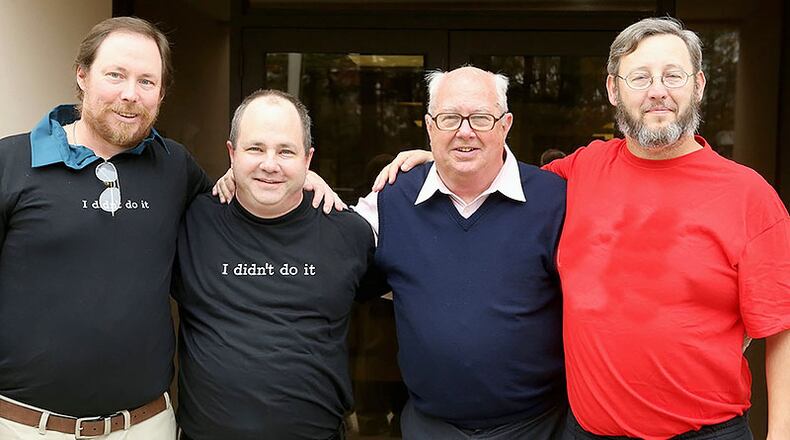Three wrongfully convicted former U.S. Army soldiers will be compensated for spending 25 years in Georgia prisons for a murder they didn’t commit.
The state Senate last week approved a trio of bills to pay Mark Jones, Kenny Gardiner and Dominic Lucci $1 million each, which is one-third of what they would’ve earned if they’d retired from the service, as they’d intended.
The money, paid out in monthly installments over 20 years, will help with the struggles the three men face after so much time lost — and endured — in prison before the Georgia Supreme Court unanimously tossed out their convictions in late 2017. The men, who were barely 20 when they were sent away, work constantly, often doing grueling labor.
It took three years for the veterans to get enough support for the compensation bills to pass through the General Assembly.
Jones said the success of this year’s effort, led by state Rep. Derek Mallow, D-Savannah, brings “the satisfaction of knowing that Georgia recognizes its responsibility to compensate for its error.” It’ll also mean “a small amount of financial independence and getting out of debt,” Jones said.
In 1992, the soldiers, stationed at Fort Stewart, were caught up in a murder case while visiting Savannah for a bachelor party.
Jones was to marry the next morning. The friends became lost on the way to a strip club. Around the same time, a Black man named Stanley Jackson, 35, was gunned down in the street by multiple shooters described by a witness as possibly white men in a dark car. The soldiers, white men in a dark car, happened to ask a police officer for directions as she walked the witness into the police station.
Soon the witness would falsely identify them as the killers. The witness, a Black minister, would later say police, prosecutors and even fellow clergy encouraged him to identify the soldiers as the killers because of fears of a riot if no one was convicted. Black residents in Savannah at the time were outraged by the Police Department’s failure to solve crimes against Black people. They alleged that detectives seemed to have a far easier time when the victims were white.
In truth, a resident told police that a group of white men had been riding around Savannah that night, threatening to shoot random Black people. The resident reported this several hours after the soldiers were arrested, but police and prosecutors never turned the report over to the defense.
Gardiner, who works seven days a week alongside his friend Jones cleaning rental homes in Texas, hopes the money will bring some peace of mind.
“To me it means being debt-free and not having to live paycheck to paycheck,” he said. “It’s not really enough to stop working but enough where I can start thinking about the possibility of an actual home for myself.”
ABOUT THE STORY
The AJC has reported on the former soldiers’ case extensively, traveling across the state and to Texas, where two of the three work together, to detail their nearly three-decade-long story. A 2020 AJC feature on their plight was passed around among lawmakers hoping to help the men in 2020 and 2021.
About the Author






